How to Hire Mobile App Developers Skilled in AI, Chatbots, and Automation: A Founder’s Guide
Introduction The mobile application landscape is no longer just about clean design and fast performance; it’s about intelligence. The integration…
The digital storefront is the new Main Street, but it comes with its own unique set of challenges. For U.S. e-commerce platforms, the exponential growth of online transactions has unfortunately been mirrored by a corresponding surge in cyber threats. From sophisticated phishing schemes to debilitating ransomware attacks, the stakes for businesses are higher than ever. In this environment, e-commerce security practices are not just technical necessities; they are fundamental pillars of customer trust, brand reputation, and legal compliance.
What if your security could not only react to threats but predict and neutralize them? This is where the transformative power of AI security in e-commerce comes into play. Artificial Intelligence is revolutionizing how online businesses protect themselves, offering capabilities far beyond traditional defenses. By leveraging advanced machine learning, behavioral analytics, and automated response systems, AI transforms passive protection into proactive defense.
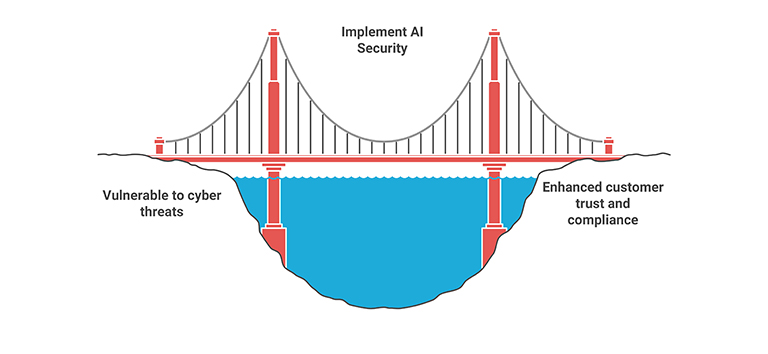
At Ndimension Labs, we understand that a secure e-commerce platform is the bedrock of a thriving online business. We combine deep expertise in secure web app development with cutting-edge AI integration to fortify your digital assets against evolving cyber threats. This blog post delves into the top five security best practices for U.S. e-commerce platforms, each supercharged by the intelligence of AI, ensuring your business remains resilient, compliant, and trusted in the digital marketplace.
The first line of defense for any e-commerce platform lies in how users and administrators are authenticated and authorized. Weak credentials are an open invitation for cybercriminals. Identity theft and account takeovers are rampant, with compromised credentials being involved in 80% of all hacking incidents. For U.S. e-commerce, protecting customer accounts and sensitive administrative panels is non-negotiable.
The Best Practice: Implement multi-factor authentication (MFA) across all user accounts, especially for administrators and high-value customer accounts. Enforce strong password policies (length, complexity, regular changes) and educate users on their importance. Regularly review access permissions to ensure the principle of least privilege is applied – users should only have access to what they absolutely need.
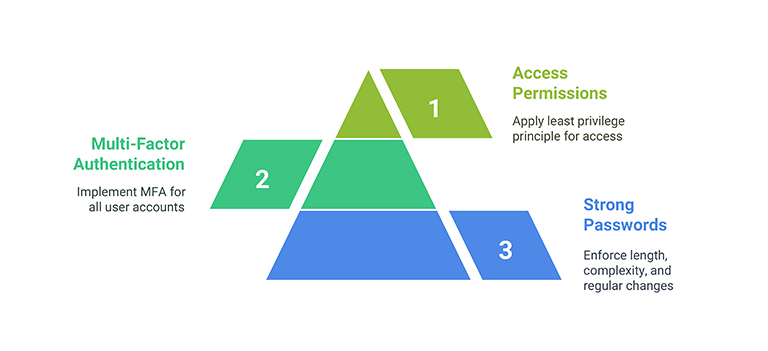
U.S. Relevance: While no single federal law explicitly mandates MFA for all e-commerce, the need for robust authentication is implicit in various data protection standards. PCI DSS, which is critical for handling payment card data, strongly recommends strong authentication, including MFA. Furthermore, protecting Personally Identifiable Information (PII) as mandated by state-specific privacy laws (like CCPA/CPRA in California, and new laws coming into effect in states like Iowa, Delaware, and New Jersey in 2025) often hinges on secure access controls.
At the heart of every e-commerce platform lies the payment process. This is where the most sensitive customer data – credit card numbers, billing addresses – is exchanged, making it a prime target for cybercriminals. Online payment fraud is predicted to cost businesses a staggering $343 billion globally between 2023-2027.
The Best Practice: Adherence to the Payment Card Industry Data Security Standard (PCI DSS) is non-negotiable for any U.S. e-commerce platform that stores, processes, or transmits cardholder data. This includes using PCI-compliant payment gateways, tokenization, data encryption, and regular security assessments. Outsourcing payment processing to reputable, PCI-compliant third-party gateways is often the safest approach, as it significantly reduces your own scope of PCI compliance.
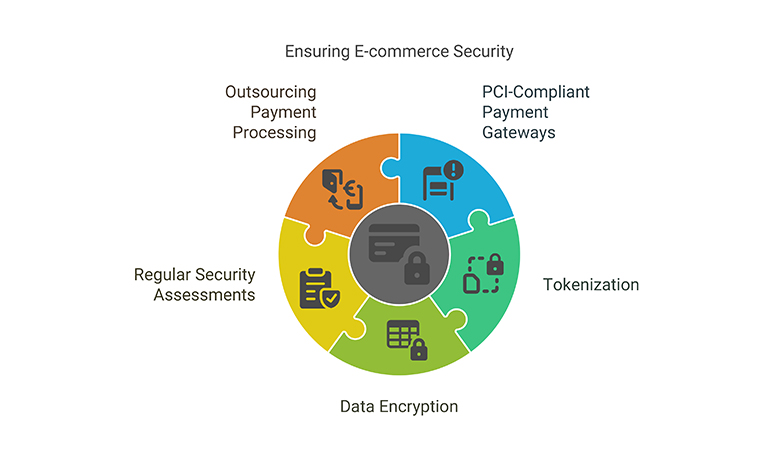
U.S. Relevance: PCI DSS is a mandatory industry standard enforced by card brands (Visa, Mastercard, etc.), and non-compliance can lead to severe fines, increased transaction fees, and ultimately, loss of ability to process credit card payments. Additionally, state data breach notification laws often require businesses to disclose payment data breaches, leading to significant reputational and financial damage.
Your e-commerce platform is constantly under attack. From sophisticated web application attacks like SQL injection and cross-site scripting (XSS) to overwhelming Distributed Denial of Service (DDoS) attacks, the digital perimeter must be fortified. The average cost of a data breach in the U.S. reached an all-time high of $9.48 million in 2023, emphasizing the critical need for proactive defense.
The Best Practice: Deploy Web Application Firewalls (WAFs) to filter and monitor HTTP traffic, protecting against common web-based attacks. Implement Intrusion Detection Systems (IDS) and Intrusion Prevention Systems (IPS) to detect and block malicious network activity. Conduct regular penetration testing and vulnerability scans to identify weaknesses before attackers do. Ensure robust DDoS protection is in place to withstand volumetric attacks.
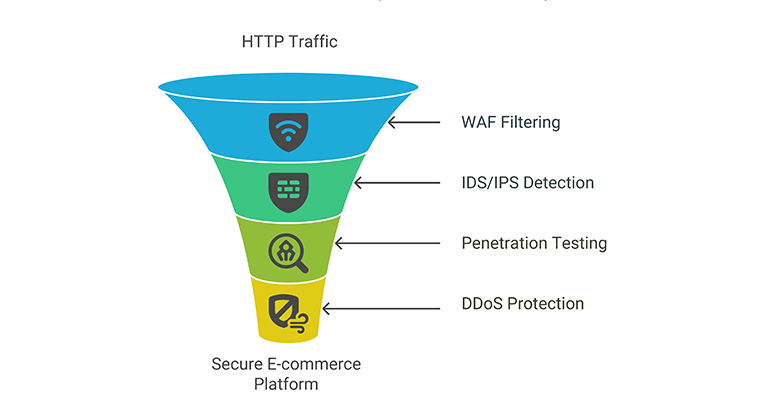
U.S. Relevance: Protecting against these threats is fundamental to adhering to various state data protection laws and maintaining customer trust. A successful DDoS attack can lead to significant downtime, costing businesses an average of $8,000 to $74,000 per hour of downtime, impacting revenue and reputation. Data breaches resulting from web application attacks can lead to costly legal action and regulatory fines.
Outdated software is a cybersecurity Achilles’ heel. Every piece of software, plugin, or framework running on your e-commerce platform can harbor vulnerabilities that, if left unpatched, become open doors for attackers. Many cyberattacks exploit known vulnerabilities for which patches have already been released.
The Best Practice: Establish a rigorous schedule for patching and updating all software components – from the e-commerce platform itself (e.g., Magento, Shopify Plus, WooCommerce) to operating systems, web servers, databases, and third-party plugins. Implement a robust vulnerability management program that includes regular scanning and penetration testing to identify and remediate weaknesses.
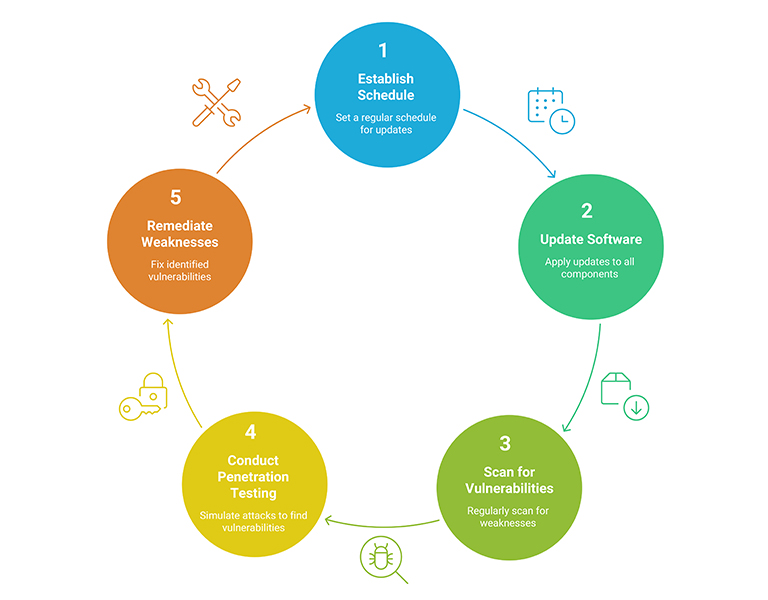
U.S. Relevance: Regulatory frameworks, while not explicitly mandating “AI in patching,” implicitly require businesses to maintain secure systems. Failure to keep software updated can be seen as negligence, leading to severe penalties in the event of a data breach. Many cybersecurity incidents, including ransomware attacks (which saw 59% of global incidents occurring in the US in 2023), often originate from unpatched vulnerabilities.
Technology alone is never enough. The human element remains the strongest, yet often weakest, link in the security chain. Human error, negligence, or susceptibility to social engineering can negate even the most advanced technical controls. Moreover, navigating the complex web of U.S. data privacy laws requires ongoing diligence.
The Best Practice: Implement comprehensive and regular cybersecurity awareness training for all employees, focusing on recognizing phishing attempts, practicing good password hygiene, understanding data handling policies, and identifying suspicious activity. Develop a clear data privacy policy that is compliant with U.S. federal and state laws (e.g., CCPA/CPRA, HIPAA for health-related e-commerce, and emerging state-specific privacy acts in 2025 like those in Iowa, Delaware, and New Jersey), and ensure your customers are aware of their data rights and your data handling practices. Regularly back up all critical e-commerce data.
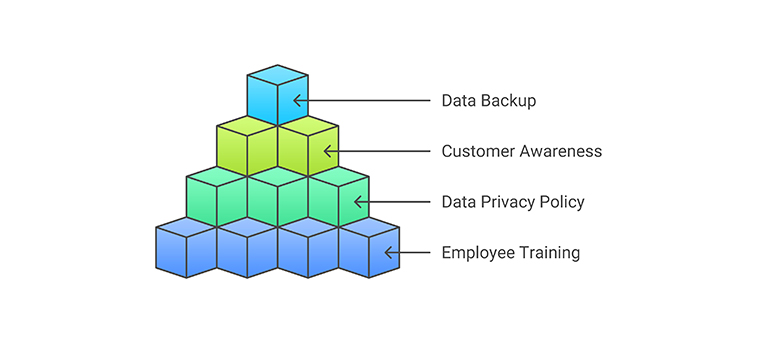
U.S. Relevance: Non-compliance with U.S. data privacy laws can result in staggering fines and significant reputational damage. For instance, violations under the CCPA/CPRA can incur penalties up to $7,500 per intentional violation. Phishing remains the most common form of cybercrime, with phishing attempts rising by 58.2% in 2023, and the financial industry being the most targeted sector. Educating employees and customers is critical to mitigating these threats.
The landscape of e-commerce security is dynamic, with threats evolving at an alarming pace. For U.S. e-commerce platforms, staying ahead requires not just robust security measures, but also intelligent, adaptive defenses powered by Artificial Intelligence. The integration of AI into these best practices transforms your security posture from reactive to proactive, ensuring continuous protection of your invaluable customer data and your brand’s reputation.
At Ndimension Labs, we are committed to being your trusted technology partner. Our expertise in secure web app development combined with our deep understanding of AI security in e-commerce allows us to craft tailored, compliant, and future-proof security strategies for your U.S. e-commerce platform. Don’t let security vulnerabilities hinder your growth.
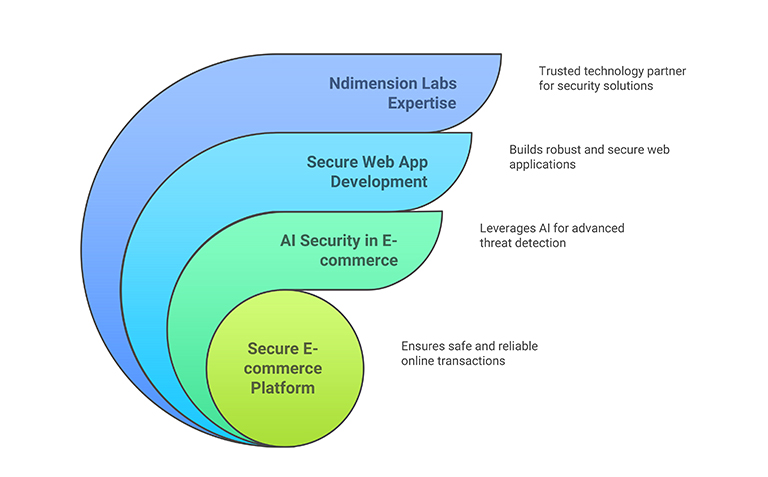
Ready to fortify your e-commerce platform with AI-driven security best practices? Contact Ndimension Labs today for a comprehensive security assessment and a customized solution that protects your business and earns your customers’ unwavering trust.

Introduction The mobile application landscape is no longer just about clean design and fast performance; it’s about intelligence. The integration…

Mobile apps are no longer just a nice-to-have; it's a fundamental part of a successful business strategy. Whether you're a…

Imagine building a house without a blueprint. You’d face constant confusion, costly mistakes, and a final result that doesn't match…